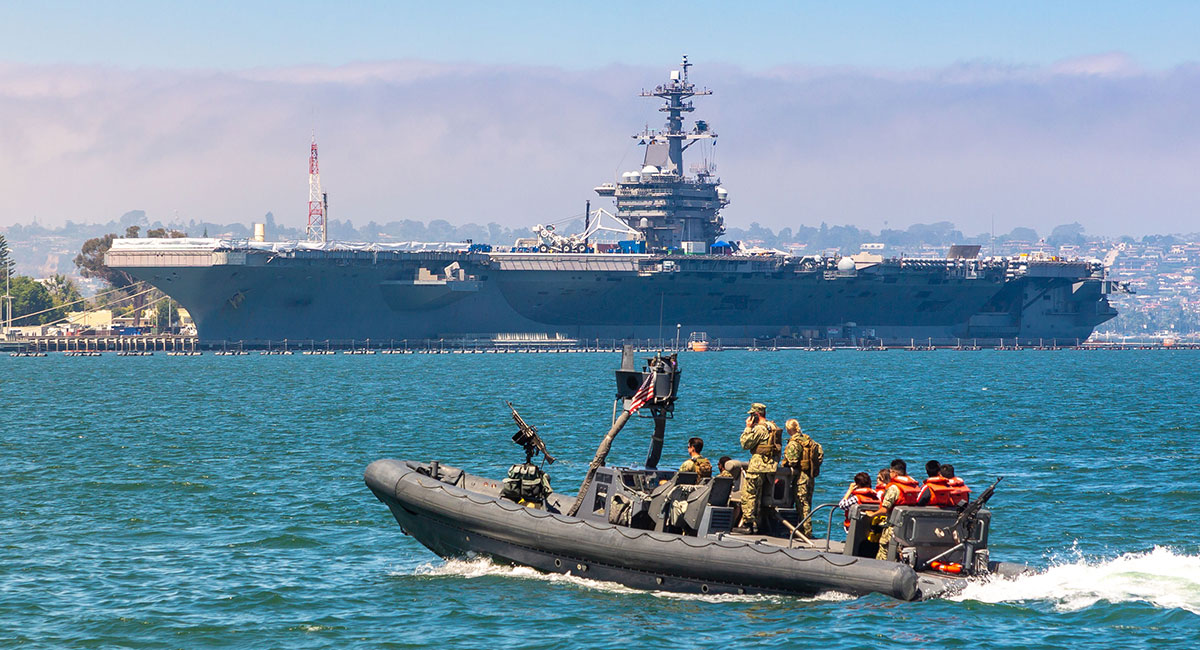The wars in Ukraine and the Middle East have captured international media attention. In the past, such “international crises” have pressured U.S. presidents to “do something” about them. President Joe Biden—who is a veteran of the Cold War and the War on Terror—has reflexively and zealously enmeshed the United States within them. Yet he has also verbally gone beyond deliberate past ambiguity on U.S. policy toward Taiwan and pledged multiple times to defend the island from an attack or invasion by China. This interventionist policy in multiple regions—Europe, the Middle East, and East Asia—is a dangerous overstretch.
Whether U.S. policymakers admit it or not—they don’t—the United States has acted as the world’s policeman since the end of World War II. Back then, the other great powers had suffered catastrophic damage to their economies and societies. In contrast, the largely damage-free United States accounted for half the world’s remaining economic output. The United States became the world’s policeman not because of its security needs but because it could. After the war, the principal potential U.S. adversary, the Soviet Union, had tempered its revolutionary expansionism and sought to rebuild its industrial capacity torched by the Nazi invasion. Also, the United States developed a lead in new potent nuclear weapons technology.
However, the world has changed much since the Allied victory in the World War and the end of the Cold War. Today, the United States only accounts for about 15 percent of global GDP but nearly 40 percent of the world’s military spending. That global overstretch is currently unsustainable and unnecessary.
The Middle East, with its chronic instability and conflicts, has forced U.S. interventions since the late 1970s to secure the global oil supply. Yet the fracking revolution has made the United States the number one oil producer in the world again. Thus, the United States maintains land, sea, and air forces in the region to guard other nations’ supplies of oil—especially those of wealthy nations in Europe, Japan, South Korea, and Taiwan. Even if the fracking revolution had not happened, buying oil at the international market price would have been cheaper than paying for expensive military forces to protect a lucrative commodity that flows even during, around, and through wars. As for the $4 billion in annual military aid to Israel, it seems to subsidize behavior counterproductive to a long-term two-state solution to the perennial conflicts over Palestine.
For starters, Europe, the primary theater of U.S. concern during the Cold War, has receded in relative economic importance. The European Union’s share of the world’s GDP has been declining and now accounts for less than 15 percent of the total. Yet, Europe’s GDP is still large compared to that of the country most threatening it, Russia, which has a GDP of less than 3 percent of the global total. With a GDP of about five times that of Russia, the Europeans must provide for their own defense and, more specifically, take over assisting Ukraine against the Russian invasion. Increasing their assistance to Ukraine and keeping the Russians busy is less costly in lives and money than fighting the Russians directly. Although the Ukrainians have done a heroic job—eliminating one-third of Russian combat forces—Ukraine is far less strategic to the United States than it is to European nations. Nevertheless, U.S. aid has already topped $75 billion—a huge contribution to European security.
The United States instead needs to focus its attention and resources on what now seems to be the region most important to the United States: East Asia. In recent decades, the combined GDP of East Asia has risen to 26 percent of the world’s total. In this region, the rise of China, the United States’ most likely future adversary, and its recent more assertive actions toward Taiwan and the South China Sea bear watching. However, President Biden should quit straying from the U.S. official policy of ambiguity toward defending Taiwan.
The Chinese threat must be put in perspective. Xi Jinping’s recent purge of generals in the PLA indicates that he fears that the rot exhibited by Russia’s military and its botched invasion of Ukraine could afflict his own military in an attack on Taiwan. As in autocratic Russia, no one in despotic China has any incentive to tell the emperor that his military has no clothes. Also, Xi has increased party and state involvement in the economy, which has already added to China’s huge economic problems caused by existing inefficient state-owned industries and banks. Therefore, the increasing relative GDP of the East Asian region and the potential of a rising China should require most of the United States’ attention and resources, but not to the point of excessive alarm or hysteria.

















